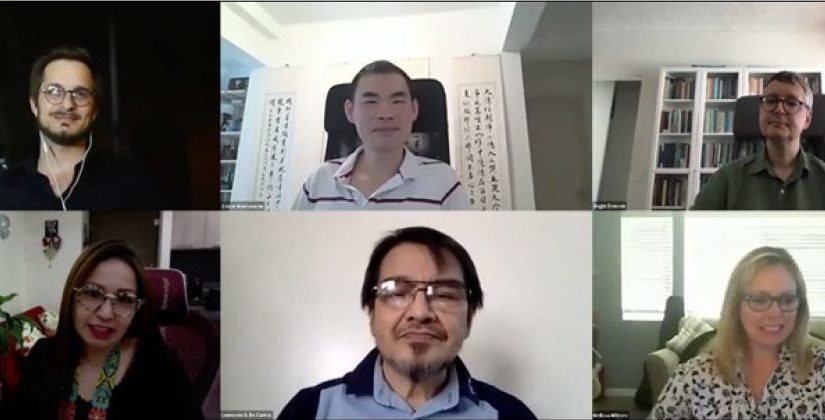
In this unprecedented moment in global health, conversation and collaboration matters more than ever. And the Association of Pacific Rim Universities (APRU) Global Health Program, based at USC, is working hard to make sure both conversation and collaboration are happening as much as possible in the new, mostly online world we live in today, amidst the coronavirus pandemic.
At the end of May, APRU Global Health hosted a webinar where five of the network’s leading minds in bioethics, philosophy, law and gerontology came together to grapple with some of the most pressing questions in bioethics amidst the COVID-19 pandemic.
How do we decide who gets scarce personal protective equipment or ventilators?
How does COVID-19 magnify pre-existing stigma and discrimination — and what can we do about it?
How can we help women who face increased gender violence under lockdown?
How do we conduct modern contact tracing amidst concerns about mass surveillance and privacy?
How do our preconceived notions of aging hurt our ability to deliver care to aging populations around the world?
More than 500 global participants took part, underscoring not just the importance of, but also the hunger for, an international, interdisciplinary conversation about the global health crisis that unites us all: COVID-19.
To keep the conversation going, the APRU Global Health Program, along with the USC Institute on Inequalities in Global Health, launched a series of eight additional webinars over the summer.
In the first of the series — which is hosted on APRUPlus.com, the one-stop destination for coronavirus content for APRU members — Dr. Karen Grépin, and associate professor at the University of Hong Kong School of Public Health, presented research on how various countries have so far responded to COVID-19, including what public health and policy researchers can learn from the failures and successes of this moment.
“To be clear, I don’t have the answers,” Grépin began. She sought, instead, to present a broader research agenda that could be carried out by the students, faculty and fellow international researchers taking part in the presentation.
Grépin’s own research has been focused on the Ebola outbreaks in the Democratic Republic of Congo and elsewhere in Africa, investigating the impact of various government responses. In January, when she arrived at the University of Hong Kong, she shifted swiftly to COVID-19.
“There are some consensus items,” she explained.
Generally-speaking, other disease outbreaks have taught researchers a few key things:
- That the overall impact of an outbreak can be much greater than the disease itself due to the way the outbreak affects existing health systems
- That a government’s response can lead to many important unintended consequences
- That global cooperation amongst countries is critical
And yet, in the midst of the coronavirus pandemic, few of these lessons have been heeded.
“Overall, we’re doing a very terrible job,” said Grépin.
At the close of her talk, questions poured in from Sydney, the Philippines, Hong Kong, Korea and the US. And that is one of the key purposes of these webinars — not just to disseminate information from across the consortium of top research universities along the Pacific Rim, but to foster the spirit of communication and collaboration.
Christopher Tremewan, the APRU Secretary General, based in Hong Kong, acknowledges that the shift online for many of APRU’s activities has been a great benefit to all.
The series continued this month, starting with a webinar on June 12 revisiting the conversation on bioethics with Professor Angus Dawson of the University of Sydney. On June 19, Professor Haidong Kan of the School of Public Health at Fudan University discussed how environmental factors, such as pollution, impact the spread of COVID-19. This week, Dr. Jean Encinas Franco of the College of Social Sciences and Philosophy at the University of the Philippines, Diliman, will discuss the role of Filipino health workers abroad during the pandemic. On July 3, Dr. Jill Murphy, of the Department of Psychiatry at the University of British Columbia, will discuss how the pandemic has impacted mental health in the Asia Pacific. And future webinars will cover One Health, human rights, and protecting health care workers.
Mellissa Withers, the director of the APRU Global Health Program and associate professor at the Keck School of Medicine of USC, has been instrumental in bringing together the participants and moderating the discussions. For her, the coronavirus pandemic created a unique opportunity for the APRU Global Health Program to lead the way. “We were well positioned to do that because of the expertise within the network and our history of collaboration,” she said.
USC has played an integral role in APRU since its founding in 1997 when USC President Steven B. Sample and the presidents of UCLA, UC Berkeley and Caltech first established the alliance. It now comprises 51 leading research universities from 18 economies of the Pacific Rim, and brings together thought leaders, researchers and policy-makers to exchange ideas and collaborate on effective solutions to the challenges of the 21st century.
For more information and to register, visit APRUPlus.com